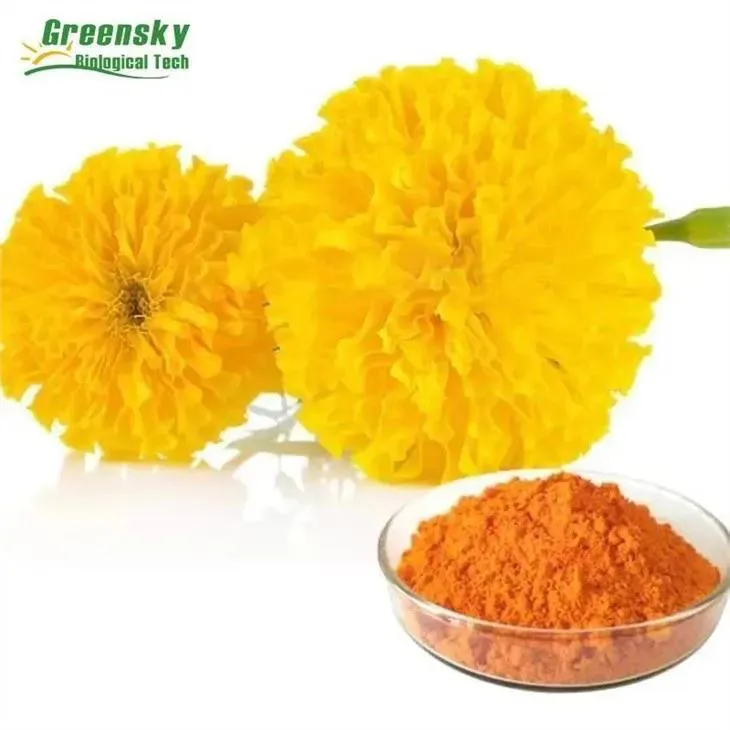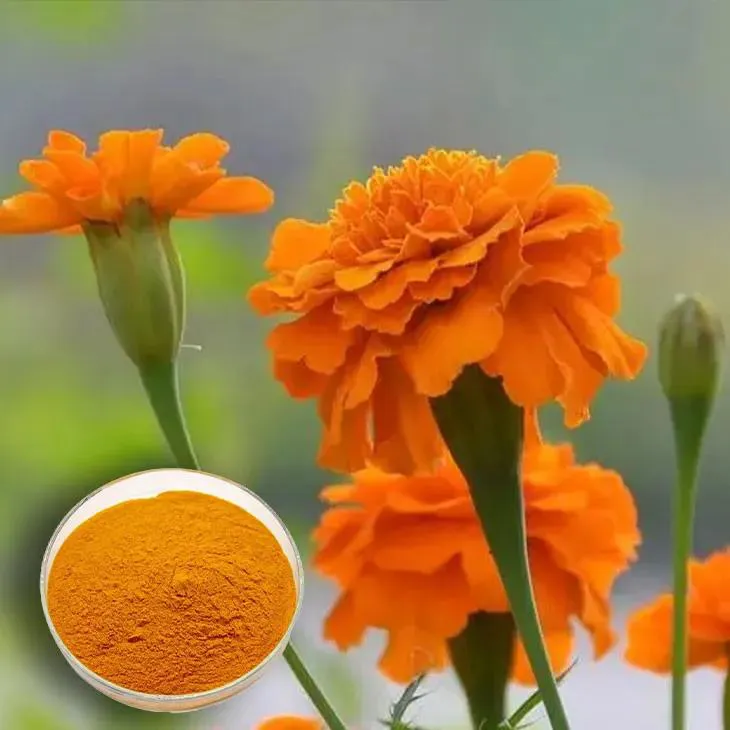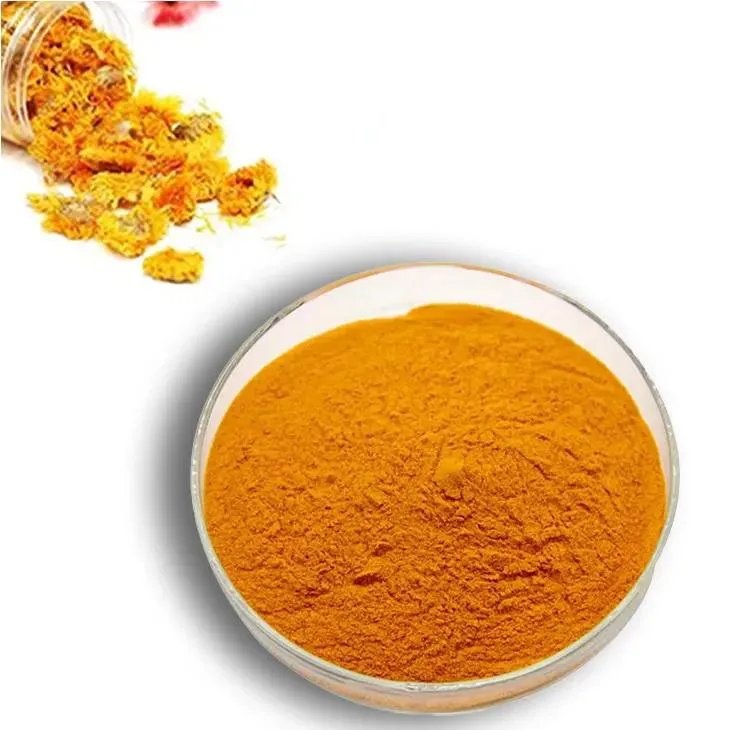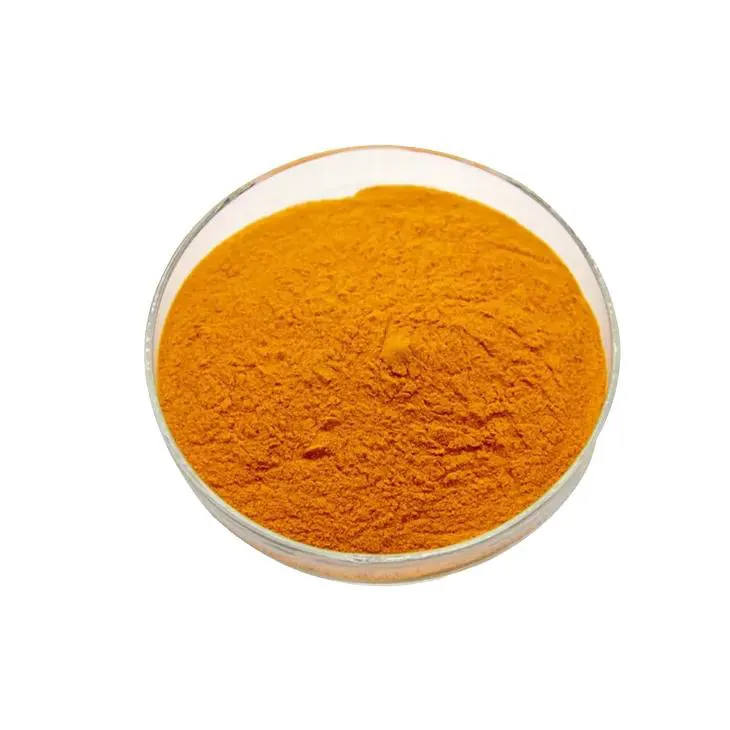- 0086-571-85302990
- sales@greenskybio.com
Marigold Extract: Benefits, Uses and Possible Side Effects
2024-11-13

1. Introduction
Marigold Extract has emerged as a substance of great interest in recent times. Derived from the marigold flower (Tagetes spp.), this extract contains a rich profile of bioactive compounds. These compounds are responsible for a wide range of potential benefits, which have led to its use in various industries, including healthcare, cosmetics, and food.

2. The Composition of Marigold Extract
Marigold Extract is composed of several important components. Lutein and zeaxanthin are two of the most notable carotenoids present. These are antioxidants that play a crucial role in eye health. Additionally, flavonoids such as Quercetin are also found in marigold extract. These flavonoids contribute to the extract's anti - inflammatory and antioxidant properties.

3. Benefits of Marigold Extract
3.1 Eye Health
The presence of lutein and zeaxanthin in marigold extract makes it highly beneficial for eye health. These carotenoids are concentrated in the macula of the eye, which is responsible for central vision. They help to protect the eyes from harmful blue light and oxidative stress. Studies have shown that a diet rich in lutein and zeaxanthin can reduce the risk of age - related macular degeneration (AMD) and cataracts.
3.2 Skin Health
- Moisturizing: Marigold extract has excellent moisturizing properties. It helps to keep the skin hydrated by preventing water loss, leaving the skin soft and supple.
- Anti - Inflammatory: The flavonoids in marigold extract can reduce inflammation on the skin. This makes it useful for treating skin conditions such as eczema and dermatitis.
- Wound Healing: Marigold extract has been shown to promote wound healing. It stimulates the growth of new skin cells and can reduce the risk of infection.
3.3 Anti - Inflammatory and Antioxidant Effects
The flavonoids and carotenoids in marigold extract act as powerful antioxidants. They neutralize free radicals in the body, which can cause cellular damage and contribute to various diseases. Additionally, the anti - inflammatory properties of marigold extract can help to reduce inflammation in the body, which is associated with conditions such as arthritis, heart disease, and cancer.

4. Uses of Marigold Extract
4.1 In Cosmetics
- Skincare Products: Marigold extract is a common ingredient in skincare products such as creams, lotions, and serums. It is used for its moisturizing, anti - inflammatory, and anti - aging properties.
- Haircare Products: In haircare, marigold extract can be used to improve the condition of the hair. It can add shine, reduce frizz, and promote hair growth.
4.2 In Healthcare
- Supplements: Marigold extract is available in supplement form. These supplements are often taken to support eye health, reduce inflammation, and boost the immune system.
- Traditional Medicine: In some traditional medicine systems, marigold extract has been used to treat a variety of ailments, including digestive problems, menstrual cramps, and respiratory infections.
4.3 In the Food Industry
- Food Coloring: Marigold extract is a natural food coloring agent. It is used to add a yellow - orange color to foods and beverages.
- Nutritional Additive: Due to its high content of lutein and zeaxanthin, marigold extract can be added to foods as a nutritional additive to improve eye health.

5. Possible Side Effects of Marigold Extract
While marigold extract has many potential benefits, it is important to be aware of the possible side effects.
- Allergic Reactions: Some people may be allergic to marigold extract. Allergic reactions can range from mild skin rashes to more severe symptoms such as difficulty breathing and anaphylaxis.
- Interactions with Medications: Marigold extract may interact with certain medications. For example, it may interact with blood - thinning medications, increasing the risk of bleeding. It is important to consult a healthcare provider before taking marigold extract if you are on any medications.
- Gastrointestinal Issues: In some cases, marigold extract may cause gastrointestinal problems such as nausea, vomiting, and diarrhea. This is more likely to occur at high doses.
6. Precautions and Recommendations
- Patch Test: Before using any product containing marigold extract on your skin, it is advisable to perform a patch test. Apply a small amount of the product to a small area of skin and wait 24 - 48 hours to see if any allergic reaction occurs.
- Dosage: If you are taking marigold extract in supplement form, it is important to follow the recommended dosage. Taking too much marigold extract can increase the risk of side effects.
- Consult a Professional: If you have any underlying health conditions or are taking medications, it is always best to consult a healthcare provider or a professional in the field of nutrition before using marigold extract.
7. Conclusion
Marigold extract is a versatile substance with a wide range of potential benefits for eye health, skin health, and overall well - being. However, it is not without its risks, and it is important to be aware of the possible side effects and take appropriate precautions. By understanding the benefits, uses, and side effects of marigold extract, consumers can make informed decisions about whether to incorporate it into their diet, skincare routine, or healthcare regimen.
FAQ:
What are the main benefits of marigold extract?
Marigold extract has several main benefits. For eye health, it contains lutein and zeaxanthin which are important for maintaining good vision. In terms of skin, it has skin - nourishing properties and is a popular ingredient in cosmetics. It may also have antioxidant properties which can help protect the body's cells from damage.
How is marigold extract used in cosmetics?
Marigold extract is used in cosmetics for its skin - nourishing capabilities. It can be added to creams, lotions, and other skincare products. It may help to moisturize the skin, improve skin texture, and potentially have anti - aging effects. It can also soothe irritated skin due to its natural properties.
Are there any potential side effects of marigold extract?
Yes, there can be potential side effects. Some people may experience allergic reactions to marigold extract. It could cause skin rashes, itching, or redness, especially in those with sensitive skin. Ingesting large amounts may also lead to some digestive issues, though this is less common.
Can marigold extract really improve eye health?
The lutein and zeaxanthin in marigold extract are beneficial for eye health. These compounds are concentrated in the retina and can help protect the eyes from harmful light and oxidative stress. They may also play a role in reducing the risk of age - related macular degeneration and cataracts, but it should be noted that it is part of a comprehensive approach to eye health and not a sole solution.
How is marigold extract obtained?
Marigold extract is typically obtained through a process of extraction from the marigold plant. This can involve using solvents to draw out the active compounds. The plant parts used usually include the flowers, which are rich in the beneficial substances. After extraction, the extract can be purified and concentrated for various applications.
Related literature
- The Benefits of Marigold Extract in Skincare"
- "Marigold Extract and Eye Health: A Scientific Review"
- "Potential Side Effects of Herbal Extracts: The Case of Marigold"
- ▶ Hesperidin
- ▶ citrus bioflavonoids
- ▶ plant extract
- ▶ lycopene
- ▶ Diosmin
- ▶ Grape seed extract
- ▶ Sea buckthorn Juice Powder
- ▶ Beetroot powder
- ▶ Hops Extract
- ▶ Artichoke Extract
- ▶ Reishi mushroom extract
- ▶ Astaxanthin
- ▶ Green Tea Extract
- ▶ Curcumin Extract
- ▶ Horse Chestnut Extract
- ▶ Other Problems
- ▶ Boswellia Serrata Extract
- ▶ Resveratrol Extract
- ▶ Marigold Extract
- ▶ Grape Leaf Extract
- ▶ blog3
- ▶ Aminolevulinic acid
- ▶ Cranberry Extract
- ▶ Red Yeast Rice
- ▶ Red Wine Extract
-
Rosemary extract
2024-11-13
-
Gynostemma pentaphyllum extract
2024-11-13
-
Sophora Flavescens Root Extract
2024-11-13
-
Grape Seed Extract
2024-11-13
-
Sophora Japonica Flower Extract
2024-11-13
-
Kupilu Extract
2024-11-13
-
Lavender Extract
2024-11-13
-
Andrographis Paniculata Extract Powder
2024-11-13
-
American Ginseng Root Extract
2024-11-13
-
Acerola Extract
2024-11-13





















